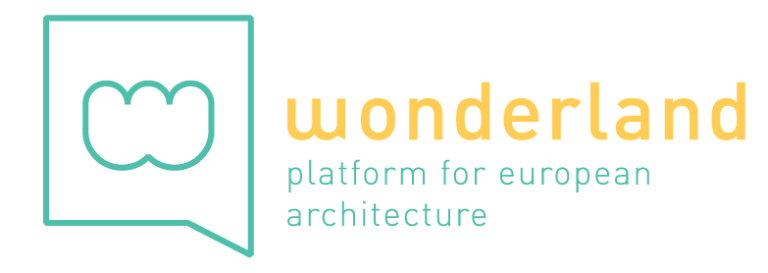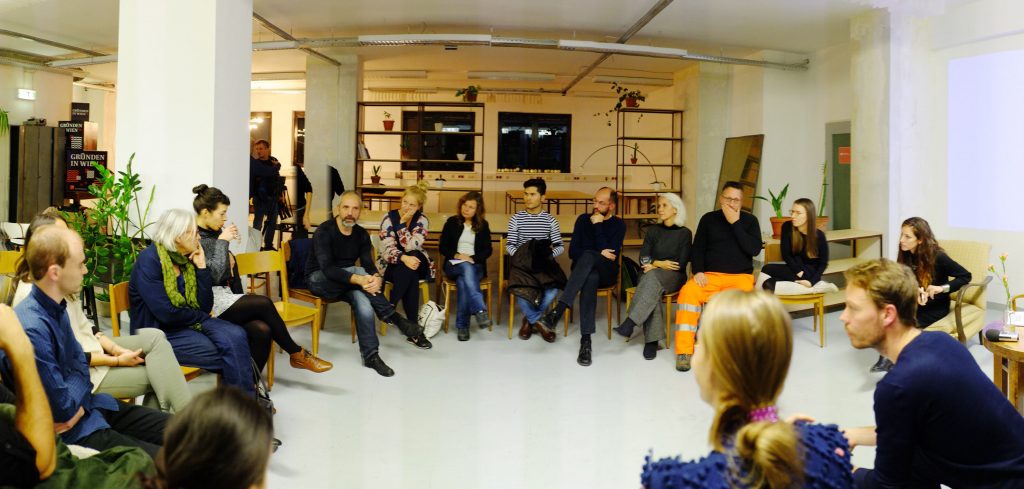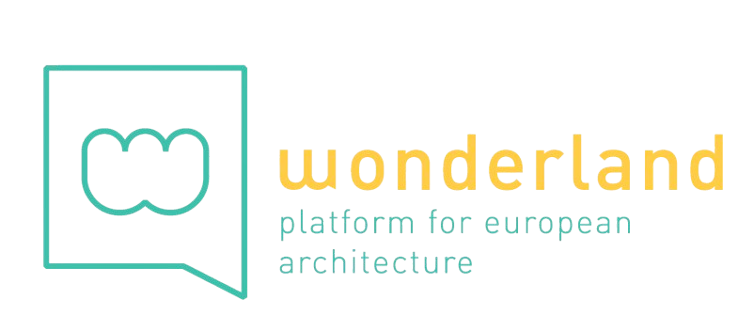Arriving to the Cooperative City_The Vienna Refugee Coalition
Vienna, 19.11.2016
Emerging initiatives tackling current issues and challenges of the European Urban Agenda
The Field Trip to Vienna, organized in cooperation with Pakhuis de Zwijger and New Europe – Cities in transition, aimed at discovering and documenting emerging initiatives that are carrying out innovative solutions to tackle the challenges of the European Urban Agenda. After spending two days in Bratislava, a group of European city makers and planners seized the opportunity to exchange thoughts and ideas with local initiatives on site in Vienna.
By inviting practitioners from various fields in politics and planning to Vienna, wonderland resumed a dialogue started in July at the Austrian Embassy Berlin with the event „Living the Cooperative City Berlin“, presenting innovative architectural projects by and with migrants and new arrivers in Vienna and Berlin.
Two of these emerging social businesses also showcased at the Berlin event that could now be visited on site were bockwerk, initiated by social worker Christian Penz for the association Flüchtlingsprojekt Ute Bock and magdas HOTEL, run by Caritas and designed by AlleswirdGut architecture.
Bockwerk is a wood-workshop, offering work and communal activity to new arrivers and previously refused asylum seekers in Vienna with a particular focus on collaborations with architects and designers. The project is giving people without permission to stay in Austria a chance to work and hence is opening new perspectives in a legal environment that persistently keeps Asylum seekers out of the Austrian labor market. Inspired by the Berlin-based project cucula, bockwerk creates high-end furniture for individual use as well as exhibitions or fashion events.
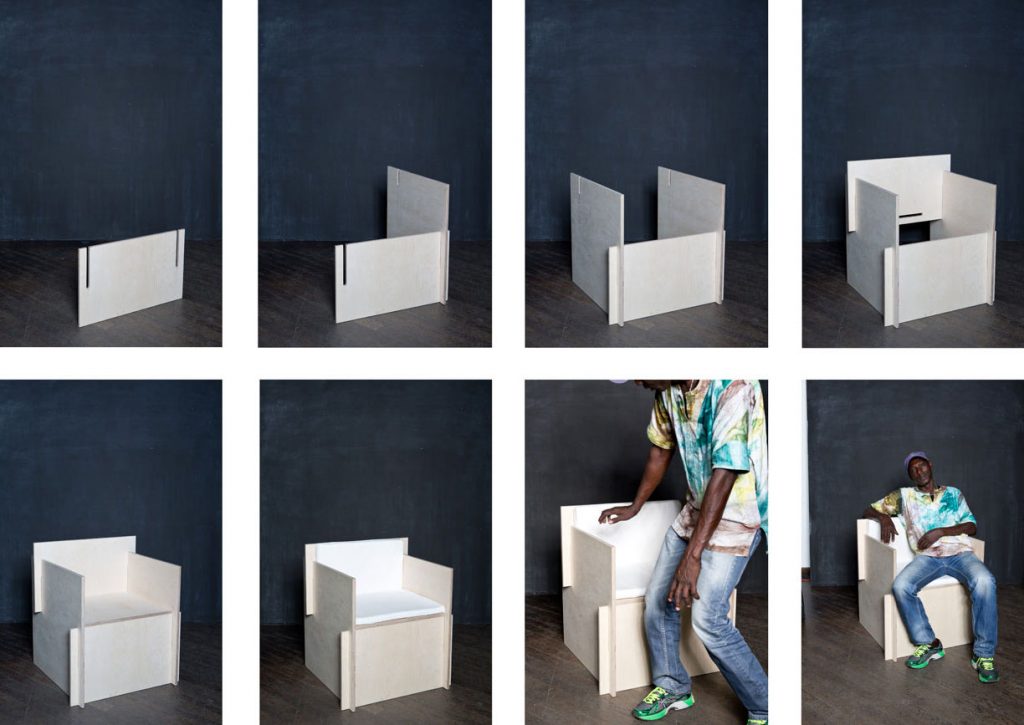
But even after having been granted permission to stay in Austria, finding work remains a challenging task. This is where magdas HOTEL comes in. Gabriela Sonnleitner and architect Johanna Aufner explained the history and purpose of this social business that has gained broad public attention in recent years: a hotel run by the NGO Caritas, where a group consisting of both migrant and Viennese volunteers collaborated with the architects during the construction phase, with neighbors and whole companies contributing furniture, time and workforce. Now the newly arrived Viennese are collaborating with local professionals in the management of the hotel where 23 languages are spoken by the staff alone. Each room has its own atmosphere and design. With contributions from people all over Austria and beyond that had followed the planners´ open call for donations.
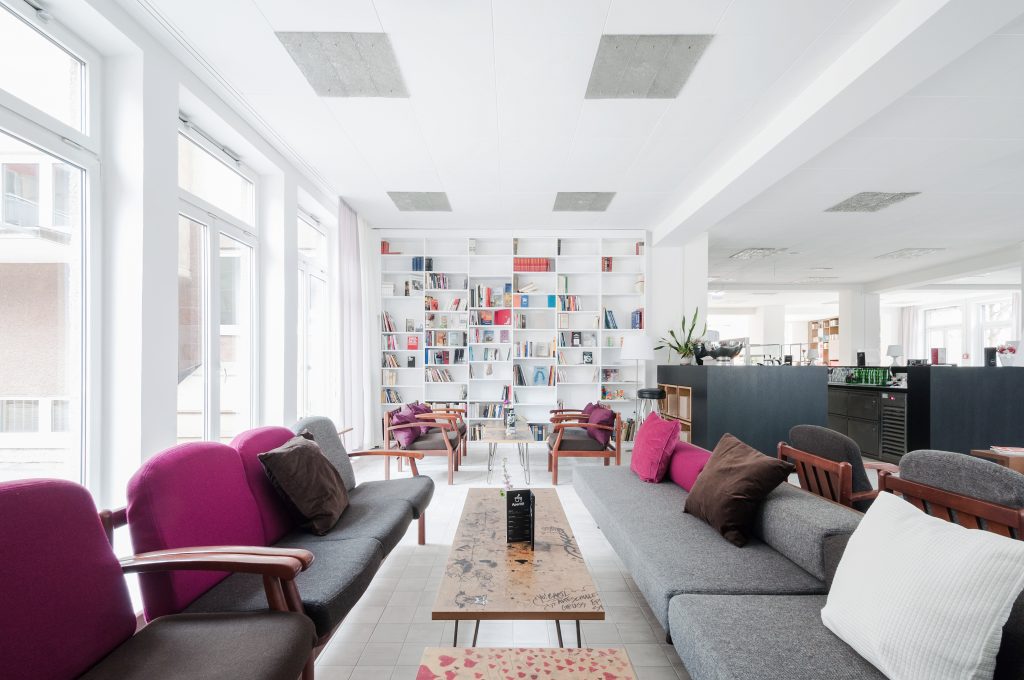
In addition to these projects, the Field Trip included a visit to the association Purple Sheep near Meidlinger Markt in Vienna´s 12th district. This organization provides shelter and legal advice for families threatened to be deported from Austria in spite of them having lived here for years as an integral part of society, as Karin Klaric, founder of the association, pointed out. The association´s top priority is to not only give the families a place to stay, but to reveal and highlight deficits in the execution of Austrian asylum law that then often result in unfavorable decisions, and to challenge these decisions. At the market in Meidling, the NGO is running a small restaurant, where people living in the house cook and socialize with neighbors.
Following these site visits, wonderland hosted a public presentation and roundtable discussion at Das Packhaus, including additional citizen initiatives and representatives of the City of Vienna in order to foster a dialogue between municipal officers, EU institutions and urban professionals to highlight the potentials of cooperation and to enrich the ongoing work of the Urban Agenda Partnerships with experiences “from the ground”.
Paradocks offers space for cultural and artistic initiatives in Vienna. Veronika Kovacsova and Margot Deerenberg have guided the transformation of a formerly vacant office block of 2.200 m2 into 65 studios for creative and social companies and have shared their experience and insight into the project with the visitors in a tour before the public event.
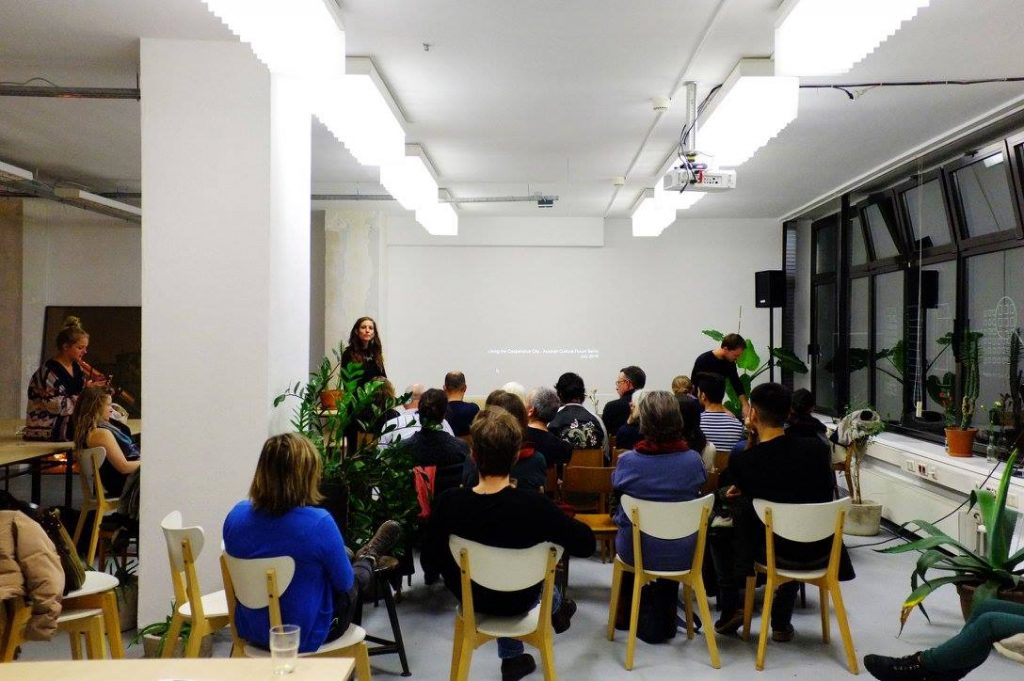
Following an introduction by Eutropian´s Daniela Patti und Levente Polyak, Marlene Rutzendorfer / wonderland presented the results of the Berlin-event at the Austrian embassy in July titled „Living the Cooperative City Berlin“ , where madgasHOTEL and bockwerk as well as others now also present at the event in Vienna had exchanged with organizations and planners from Berlin and had visited shelters and innovative local projects. Two of these participating projects were „Fluchtraum Österreich“ by Johannes Pointl and Nina Kolowratnik and „Dis/placed“ by Karin Harather and Renate Stuefer / TU Wien.
Both initiatives work together with students and demonstrate the possibilities and positive effects of a long term commitment to the topic within a University context. While Fluchtraum Österreich at TU Wien is part of the Echoing Borders initiative at Columbia University and has dedicated its work to research on the fields of architecture and asylum, „Dis/placed“ was started as a hands-on project – similar to design build studios at TU Wien – during the fall of 2015, when the government was no longer able to provide shelter for refugees arriving to Vienna – most of these fleeing from the war in Syria – and NGOs, Universities and private initiatives helped secure accommodation and provisions for thousands of people. „Dis/placed“ started out with adapting and redesigning a vacant building in Vienna´s 3rd district together with its inhabitants and in cooperation with the Austrian Red Cross that was running the place. In a short film by Renate Stuefer, the project was presented to the audience at Packhaus in a very direct and immediate manner, documenting the dedication and innovation behind this transformation of a place that was initially unfit to house people, lacking infrastructure and common spaces into a home offering spaces and activities, in which inhabitants and students co-created furniture and exchanged thoughts and knowledge. Meanwhile, the shelter has been closed and the project has moved on to the next house it aims to improve.
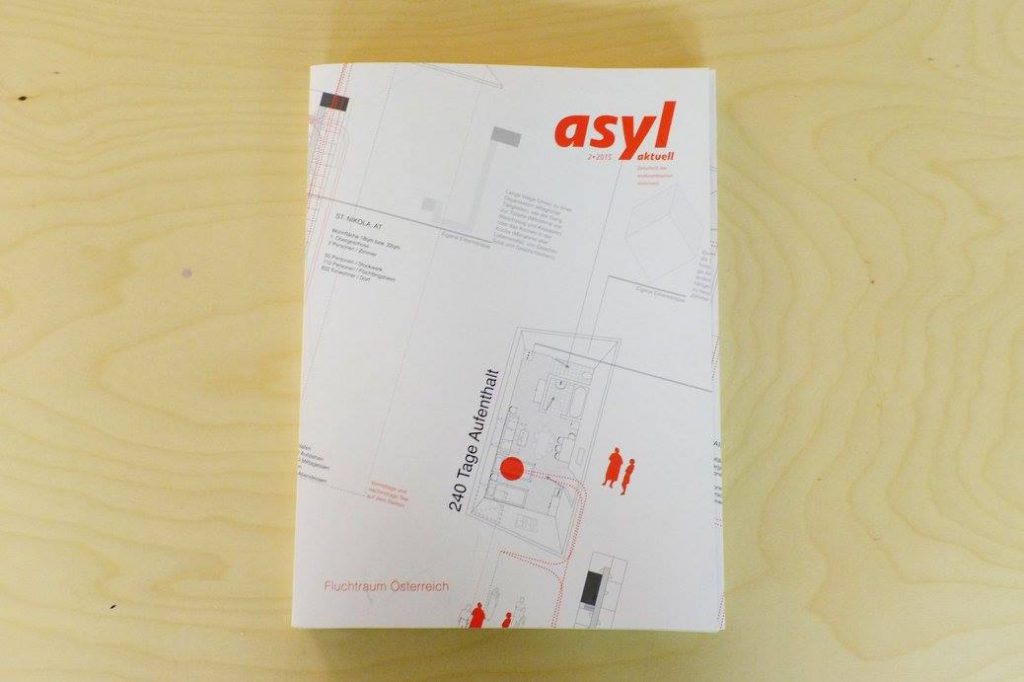
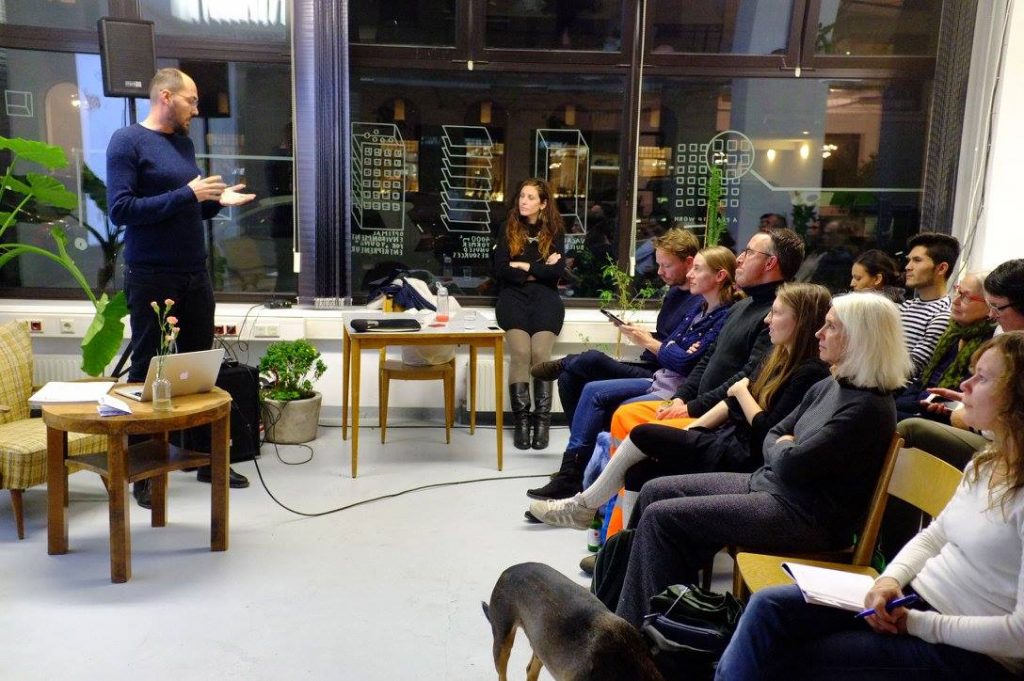
Johannes Pointl added Fluchtraum Österreich´s most recent studies to the discussion, presenting and mapping the role of private volunteers and informal institutions in Lesvos, Greece, that are essential to the infrastructure provided for refugees on the island, where, quite similarly to the situation in Vienna in fall 2015, even if so in a long term perspective, the state and even NGOs are not able to care for the needs of people arriving and temporarily staying there. The results of this study have recently been presented at the Oslo Architecture Triennale „After Belonging“. Fluchtraum Österreich sets its focus on spacial structures and borders that have been erected for and around asylum seekers both in Austria and internationally.
An extended discussion panel following the presentations also included Harald Gruendl, EOOS / Orte für Menschen and Eva Kail, MA 21, Magistrat der Stadt Wien, who both brought in their specific insights on the current situation of regulations and possibilities in housing and urban planning providing spaces designed for and by new arrivers in Vienna.
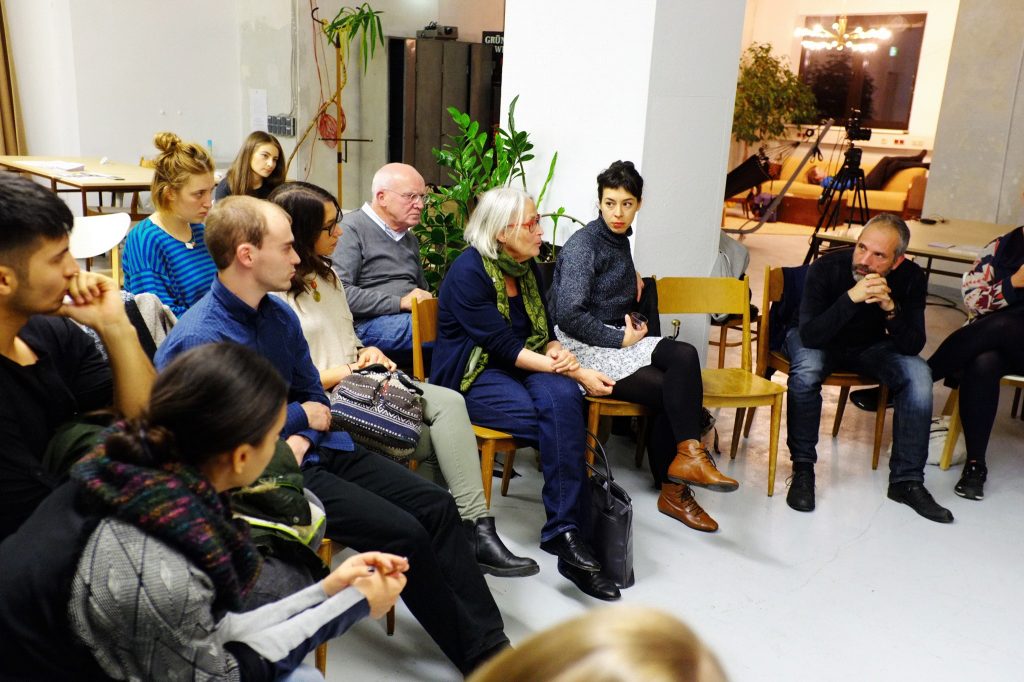
The event has brought together innovative initiatives addressing Urban Agenda challenges including job creation, affordable housing, the inclusion of migrants, and circular economy, highlighting challenges and potentials of EU policy on the urban scale.
During site visits, short video interviews were held with the initiators, in order to disseminate their practices for a wider audience. These interviews will soon be available and be shared by wonderland – platform for european architecture.
The Metropolitan Fieldtrip Vienna_The Vienna Refugee Coalition has been one more step in wonderland´s effort to promote a dialogue between city administrations, city makers and EU institutions in order to guarantee a richer variety of inputs into the policy elaboration of the EU Urban Agenda. Wonderland´s focus on the topics of migration and architecture that have been presented and discussed here as well as at the Architektur.Film.Sommer 2015 will continue and be developed further in 2017.
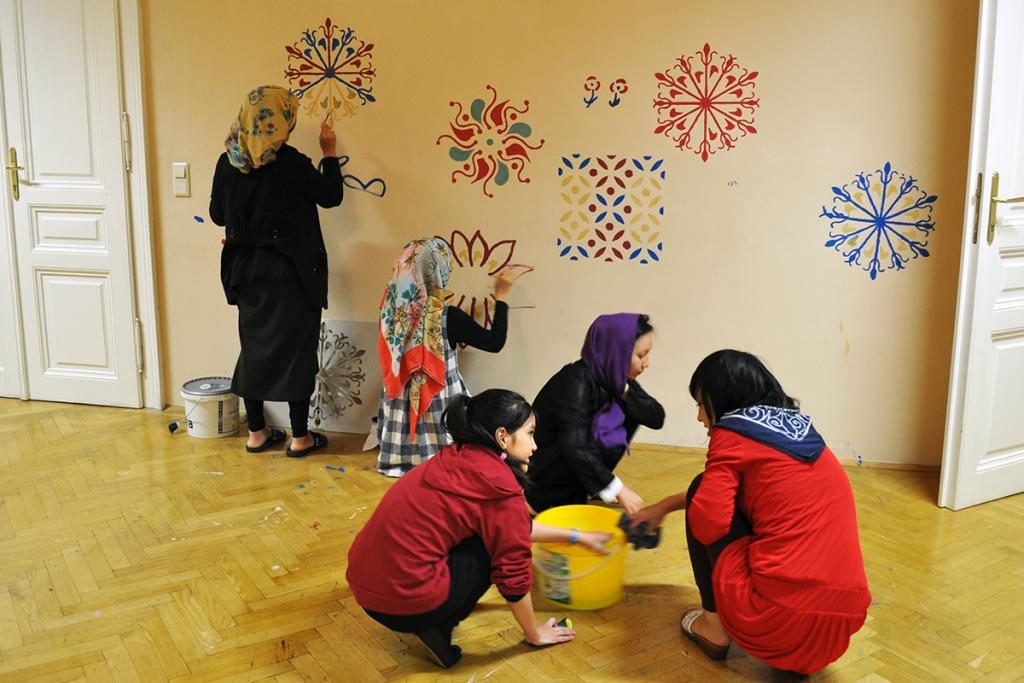
Partners Metropolitan Fieldtrip Vienna:
Eutropian GmbH (eutropian.org) is a Vienna based urban planning firm that promotes collaborative planning processes throughout Europe with a special focus on social innovation and inclusive development. Eutropian has recently been awarded the Vienna Chamber of Commerce grant for creative industries in order to promote the urban magazine “The Cooperative City” (cooperativecity.org). Additionally, Eutropian is very involved in various European cooperation project connected to sustainable urban development, such as under the URBACT program.
Paradocks (paradocks.at) is an organisation based in Vienna that offers space for cultural and artistic initiatives, currently using ’Das Packhaus’, an empty office block of 2.200 m². In 2014 they were awarded the 1st Prize of CITY HYPE, by Departure – Die Kreativagentur der Stadt Wien, the Vienna Business Agency.
International Partners:
Pakhuis de Zwijger (https://dezwijger.nl) is a unique cultural organisation which opened its doors in 2006 and has grown to be an independent platform for and by the city of Amsterdam and its inhabitants. Under the name of New Amsterdam – City in Transition Pakhuis de Zwijger organises events on the urgent and complex urban challenges of today. The ex-cooling warehouse is today home to the creative industry and the people who make the city what it is. We call them City Makers, a title of honor. They are the centre of the stories we tell every day. Our goal is always to inform, inspire and create.
New Europe – Cities in Transition:
European magazine on the City Makers Agenda, (citiesintransition.eu)
